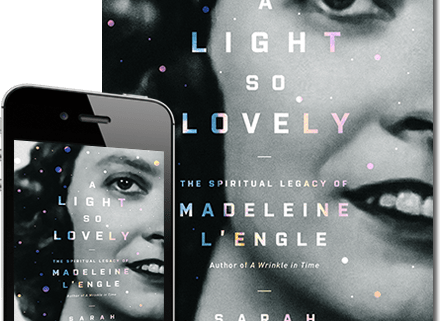A Light So Lovely: The Spiritual Legacy of Madeleine L’Engle by Sarah Arthur
Sarah Arthur’s forthcoming A Light So Lovely: The Spiritual Legacy of Madeleine L’Engle is available for pre-order now and in stores on August 7th. It’s a wonderful exploration of the impact Madeleine L’Engle has had on numerous writers and artists. Madeleine’s granddaughter Charlotte (co-author of Becoming Madeleine: A Biography of the Author of A Wrinkle in Time by Her Granddaughters) wrote the foreword, which we share with you in its entirety here.
The first time I spoke with Sarah, I cried. While it doesn’t take a great deal for me to have tears break the surface these days, as Sarah asked me questions and shared her thoughts about my grandmother, I knew I’d met someone with deep compassion, curiosity, and intellect. We talked about my grandmother’s life: her habits, milestones, and challenges, and what we each knew to be her impact on others. As we spoke, what moved me to tears was Sarah’s willingness to look at Madeleine and accept her as a full and flawed human being; an icon and iconoclast, not an idol.
In Walking on Water: Reflections on Faith and Art (a 1980 book that, as Sarah demonstrates, shook a generation of evan- gelical Christians with its expansive view of God’s love for all of creation), Madeleine warns that “paradox is a trap for the lazy,” and she challenges her readers to embrace “both/and.” Sarah takes on the challenge and structures her book as a series of what are commonly thought of as binary choices: sacred/ secular, faith/science, fact/fiction, and more.
A Light So Lovely explores what Madeleine L’Engle has meant to a generation or more of Christians who are searching for something that would restore their faith and who found that something in Madeleine’s language of wonder, hope, and joy, often to a rather extraordinary degree. The book combines interviews with artists and friends (and I’m sure I’m not the only one who cried during a conversation with Sarah), close readings and analyses of not just Madeleine’s works but of the changing Christian landscape of the past fifty years, and Sarah’s own memoir-like interventions and reflections that illustrate how the universal is grasped only in the particular.
The book not only (and beautifully) serves as a guide to Madeleine L’Engle’s spiritual legacy for Christians, it also (and intriguingly) can serve as a guide to evangelical Christian culture for the uninitiated. Although Madeleine’s religious upbringing and most of her practice was mainline, she found in a variety of religious communities, including evangelical circles, an audience of interlocutors that challenged and enriched her own theological understanding. For the reader whose only exposure to evangelical thought is the most recent flurry of news and analyses, looking at the conversations—sometimes friendly, sometimes vitriolic—that Madeleine and evangelicals engaged in over decades, and the ways in which her writing helped so many of the “wavering, wounded, and wondering,” is illuminating. Sarah looks at the “heresy” of universalism, the debates over science and religion, and the ways in which Madeleine’s themes of art and joy were received. Sarah’s discus- sion makes the stakes involved in those issues more legible, and I have a deeper understanding of and hope for the excavation of additional common ground.
Sarah likens the broad body of Madeleine’s work to a pod of whales, swimming together, communicating with each other, with the occasional one breaching the surface of the ocean. I love the metaphor, and believe it to be true. The cluster of messages that all of Madeleine’s books transmit include: you are loved, you matter, your questions are important, your joy fulfills a promise, fear not. This is indeed good news.
— Charlotte Jones Voiklis
Taken from A Light So Lovely by Sarah Arthur. Copyright © 2018. Used by permission of Zondervan. www.zondervan.com



